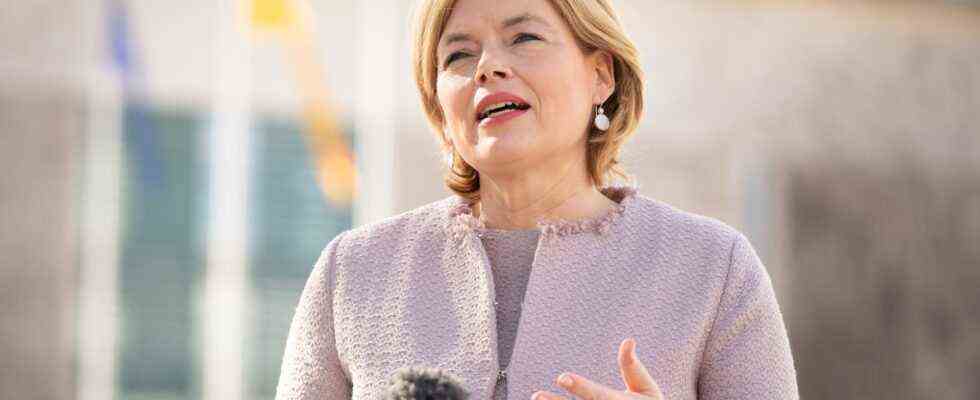Status: 07/29/2021 10:48 a.m.
As Minister of Agriculture, Klöckner wanted to change a lot. But instead of statutory requirements, it mostly relied on voluntary commitments. What did she accomplish? A balance sheet.
The tasks are big, and Julia Klöckner knew that too: Consumers, animal and environmentalists are calling for more sustainable agriculture. Farmers, on the other hand, want them to do well and their work to be recognized.
At the beginning of her term of office, the CDU minister outlined her plans as follows: “Our three main areas: animal welfare, nutrition education and the competitiveness of our agriculture.” And because agriculture and nutrition concern everyone, Klöckner likes to call their ministry the “Ministry of Life”.
The minister, who herself comes from a winemaking family, relied less on binding legal requirements and more on voluntary commitments in her policy. In the fight against obesity and an unhealthy diet, she developed a strategy together with the food industry. The goal: less sugar, salt and fat in finished products. Klöckner rejected a tax on sugar, such as that in France, for example.
A joint video on the ministry’s Twitter page with the head of the German food company Nestlé caused the minister a lot of trouble. Klöckner rejected the accusation that she was being influenced by lobbyists. She stuck to her strategy of voluntary agreements, such as the introduction of the colored “Nutriscore” logo on food packaging.
Voluntariness and freedom
Klöckner also opted for the state animal welfare label, one of the minister’s most important projects. Here, too, she met with a lot of displeasure, including from coalition partner SPD. The criticism: The plans are too unambitious, and the label is not mandatory. In the meantime, large supermarket chains have introduced their own labeling on meat packaging.
The criteria do not go far enough for consumer and animal rights activists. The state label should offer higher standards in animal husbandry. But there was no progress. Klöckner repeatedly referred to the conflict with EU law. She argued that no mandatory label could be introduced at the national level. After all, the label for better animal husbandry on meat products failed for the time being.
At odds with the environment minister
Too slowly, too late, that is what the Tierschutzbund, the Greens and the SPD criticize, even when it comes to the exit from chick killing. In the coalition agreement, an end to the mass killing of day-old male chicks was actually planned for the middle of the legislative period, i.e. for autumn 2019. Now it comes at the beginning of 2022.
During her term of office, Klöckner repeatedly clashed with Federal Environment Minister Svenja Schulze. The SPD politician wanted to enforce more biodiversity and more insect protection in agriculture and saw her cabinet colleague on the brakes. Schulze accused Klöckner of not doing enough for the environment.
Tough struggle for insect repellent
It is also about the big picture: a fundamental reform of EU agricultural support. Schulze wants to “promote agriculture that does not harm insects”. A step has now been taken towards the EU level. In future, farmers should only receive part of the funding if they do more to protect the environment and the climate.
Both ministers also appeared together: at the presentation of the insect protection action program, for example. Both also traveled to Brussels to present the plans for stricter fertilizer rules in Germany. They have to be adjusted after a complaint by the EU Commission due to excessively high nitrate levels in the groundwater.
In Germany, the requirements are met with resistance. Thousands of farmers protested against Schulze, but also increasingly against Klöckner’s policies. They oppose environmental protection regulations and demand reliability from politicians, appreciation and fair prices for their products. The minister sought understanding, but also made the farmers responsible: “We have to implement this, dear farmers, otherwise fines are threatened,” she said.
Scientists criticize clear goals
Time and again, Klöckner sees herself as a mediator between different groups. She wants “we can do one thing together. That we overcome the conflict of interests”, for example town and country, agriculture and the environment. Sustainable agriculture is a task for society as a whole.
Scientists from the industry complained that there are no concrete objectives and corresponding strategies for future agriculture, and they also see politicians as being responsible.
Future commissions and realpolitik
The minister set up a commission to draw up proposals for the conversion of animal husbandry and to calculate the costs of the restructuring for animal owners. The Bundestag approved the proposals and the Federal Government was asked to act on the recommendations.
Another commission made up of representatives from agriculture, the food industry, trade, nature and consumer protection associations agreed on proposals on how agriculture can be more environmentally friendly and farmers can do well. Klöckner saw a tailwind for their work in the work of the “Future Commission”. The criticism, including from the SPD, is clear: The agreement of the Future Commission shows how far Klöckner’s policies lag behind reality.
The tasks are great. Klöckner tackled them. But what it has achieved can at most be intermediate steps on the way to more sustainable agriculture. The Future Commission has developed proposals for solutions that can also be sustainable in the long term. And even if the proposals do not meet with approval everywhere, politicians now have concrete ideas at their fingertips. Implementation will be the task of the next federal government.

